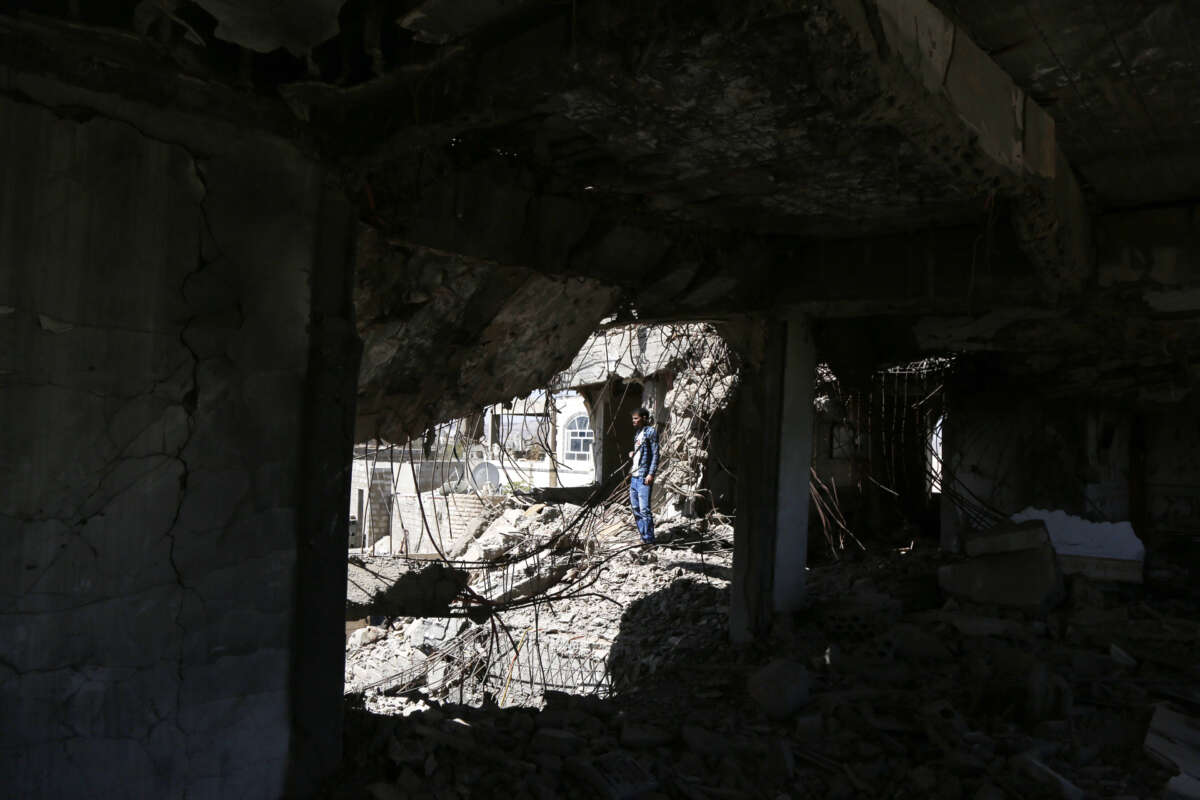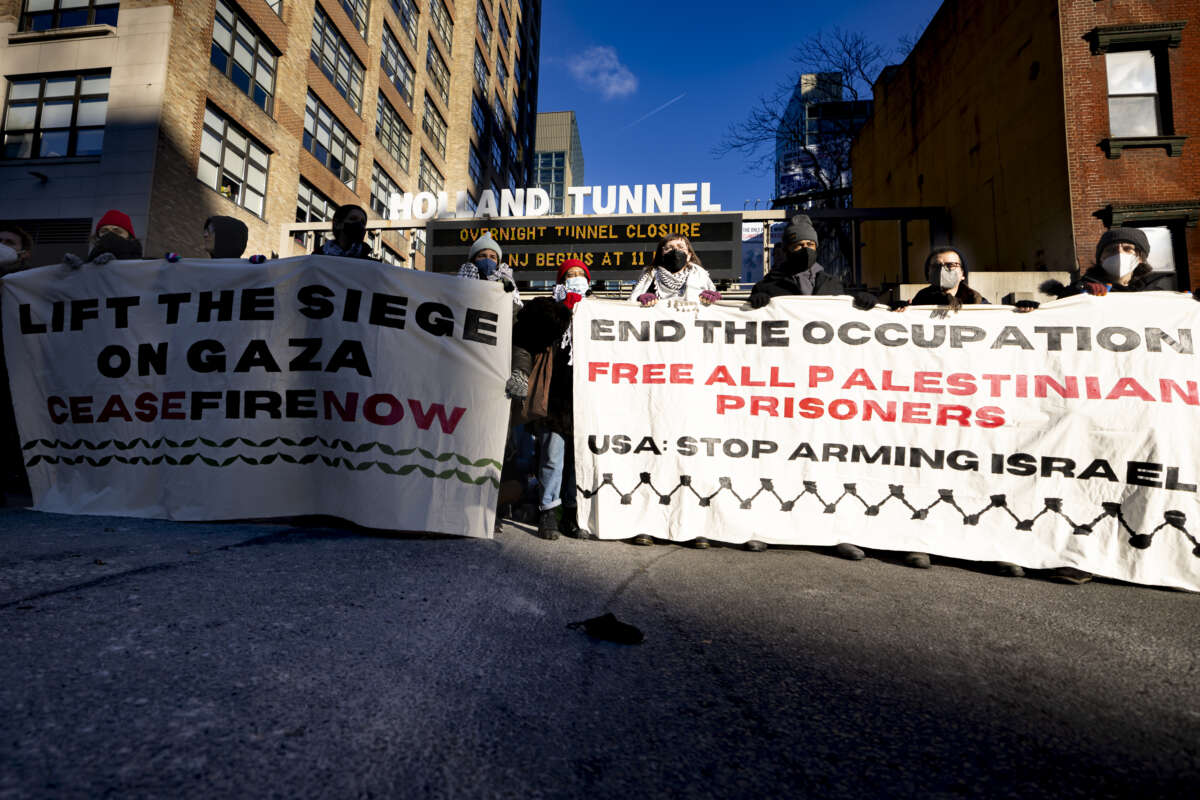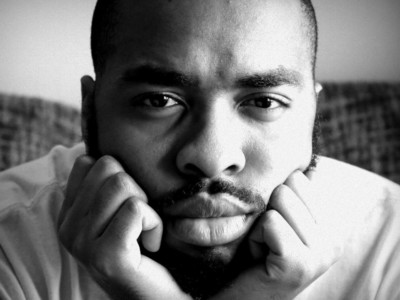People took to the streets in solidarity with Palestine—and against the West’s bombing of Yemen
Saturday 13 January 2024

A sea of solidarity on the London Palestine march (Picture: Guy Smallman)
The solidarity movement for Palestine roared back onto the streets in vast numbers on Saturday. Around 500,000 people took to the streets in London on an angry and loud march that was full of fight and determined to stop the slaughter by Israel.
This was the biggest march since 11 November—and was part of a global day of action. It was expected to see demonstrations in over 120 cities, across 45 countries and on six continents to demand an end to the bombing of Gaza and Yemen.
Many marchers said this week’s genocide hearing against Israel had made them even more determined to be active for Palestine. “The evidence wasn’t a surprise to me, but it put it in front of the whole world,” marcher Faiza, a teaching assistant from west London, told Socialist Worker.
“And it didn’t just show that Israel is guilty but also those who support Israel in the US and Britain are also just as much to blame for the killing of children.
“And I can add Keir Starmer to the list of shame because he has not backed a ceasefire. It’s so important we have come out in such numbers today.”
The movement went into something of a lull over Christmas. There’s no lull now. Protester Sam said she has no illusions in international bodies like the United Nations or the International Court of Justice (ICJ).
“I see that a genocide ruling is important, but for me, I don’t see the point in the UN or the ICJ if they don’t do anything,” she explained. “It also makes me mad that millions of people can take to the streets, and people in power just don’t listen.
“I feel like I can’t vote for Labour or the Tories. But then, who do I vote for? The Greens of the Lib Dem, I’m not sure I want to do that. For me this entire political system is broken.”

Full coverage of the struggle in Palestine
Marchers denounced the US and British assault on Yemen. Yemeni cousins Joe Al Shujaa and AK Al Shujaa from Birmingham, said, “It’s the entire population being targeted, not the Houthis as they claim
“To Starmer and Sunak, we say stop the bombing, stop supporting Israel’s war, for humanity. We protest not just for the Palestinians but we come out for everyone whether it’s for Sudan, Yemen, Syria or anywhere else.”
Marcher Sam said, “How do the Tories have money for their wars when homelessness is through the roof, the NHS is collapsing, and thousands go to foodbanks? To me, it’s disgusting.”
Julia, a Unison union member, said, “The Tories are playing with fire. And Keir Starmer should’ve condemned Israel and stood up against what the Tories are doing, especially now in Yemen.”
It wasn’t just the size of the demonstrations that was impressive. People are increasingly radical as well.
Three months ago many thought that a giant turnout on protests could win a ceasefire and perhaps blunt British support for Israel. Now they know no scale of murder that will satisfy Israeli leader Binyamin Netanyahu. And the West will mutter warnings but in the end back him.
So many people want more militant methods. The big marches are crucial to show the size of the movement and give people confidence to speak out and organise. It’s important to build the Stop The War Coalition and Palestine Solidarity Campaign’s events.
But other disruptive actions and workplace revolts are needed now as well. Halima, from Tower Hamlets in east London, said, “We need to keep momentum going.
“ Interrupting public services and disruptive actions such as sit-ins will have more of an impact. People should not go about their everyday lives. We can’t return to normal.”
Tobi from Tower Hamlets said, “We also need more workplace actions to put a stop to the economy. There has not been enough so far.”
It was a good sign that more workers than before joined the London demo. But the numbers are still far too low because the trade union leaders don’t build support. It has been up to grassroots groups to build the turnout.
On the London demonstration, Jess from CWU Members for Palestine said, “Bombs wouldn’t be built without workers. It’s on us to withdraw that labour while it is being used to kill civilians.
“We want the CWU union to do something, because it’s not. My union is the United Tech and Allied Workers union and our parent union is CWU. We need more big marches more often and more direct action. Normality can’t just resume while this is going on.”
John from Surrey said, “We need to look at what Just Stop Oil is doing and replicate that for the Palestine solidarity movement. What we are doing now is not enough—politicians are not listening.”
He described the attacks on Yemen as “disgusting”. “Why are a few rich countries attacking a poor country like Yemen?” he said.
Robina, a Unison union member from Leeds said, “We mustn’t lose momentum and we have to keep up the pressure on our government.”
She is frustrated by the lack of action from trade unions and has “not heard anything from my trade union”. “Trade unions should take a position with Palestine and stand in solidarity,” she said.
Everyone should be building for action on 7 February, a day of workplace and student action across Britain.
Climate Activists for Palestine formed a sizeable bloc on the demonstration that was much larger than in previous times.
Sean from Just Stop Oil said that anyone who can should take direct action for Palestine and against the arms trade. “We need to use every tactic we have,” he said. “We need big marches. We need to shut down arms factories and take up boycotts.
Matt, who’s also in Just Stop Oil, added, “We’re here to show that Palestine is a climate issue. We must keep repeating that there is no climate justice on stolen land.”
It’s time to raise the movement for Palestine and against imperialism to new levels.
Trade unions for Palestine
Trade union banners on the London demonstration included:
Unison Salford branch, Cambridgeshire NEU, Birmingham Unison, Camden Unison, Waltham Forest NEU, Homerton Hospital Unison, UCU Soas, CWU Essex, City and Islington NEU, Camden NEU, Bolton Unison, Goldsmiths UCU, UTAW (CWU) tech workers, West Sussex NEU, York Unison, Southend-on-Sea Unison, South Central CWU, London and Eastern region Unite, Brighton UCU, Lancaster and Morecambe NEU, IWGB—workers for a free Palestine.
Marches in Scotland
Around 1,000 marched for Palestine in Glasgow, 500 in Edinburgh and 150 in Aberdeen, for a protest at Barclays. After the main protest for Palestine at the Glasgow City Chambers, Stop the War activists led a march to the Ministry of Defence to oppose Britain bombing of Yemen.
Day of action in north west of England
Monday 15 Jan, 1pm, North West England day of action against Barclays. Barclays Bank holds over £1 billion in shares, and provides over £3 billion in loans and underwriting to nine companies whose weapons, components, and military technology have been used in Israel’s armed violence against Palestinians.
Full list of actions
Actions called by PSC, Stop the War and others:Wednesday 17 January: Why Palestine is a trade union issue. Stop the War Coalition trade union network meeting, online, 6.30pm.
Saturday 20 January: National Day of action for Palestine—local demonstrations.
Monday 22 Jan – Saturday 27 January: Stop Arming Israel Actions, including local Barclays protests on Sat 27 Jan.
Saturday 3 February: National Demonstration for Palestine in London.
Wednesday 7 February: National day of workplace and student action for Palestine
Oxfam report reveals scale of Israeli murder
Israel’s military is killing Palestinians at an average rate of 250 people a day which massively exceeds the daily death toll of any other major conflict of recent years. That was the message from the charity Oxfam this week.
Its statement shows that almost everyone outside the imperialists and their friends knows the full extent of the horror flowing from Israel’s onslaught on Gaza.
Sally Abi Khalil, Oxfam’s Middle East Director, said, “The scale and atrocities that Israel is visiting upon Gaza are truly shocking. For 100 days the people of Gaza have endured a living hell. Nowhere is safe and the entire population is at risk of famine.
“It is unimaginable that the international community is watching the deadliest rate of conflict of the 21st century unfold, while continuously blocking calls for a ceasefire.”
Oxfam calculated that the number of average deaths per day in Gaza is significantly higher than “any recent major armed conflict” including Syria, Sudan, Iraq, Ukraine, Afghanistan and Yemen.
The aid agency goes on to warn that Israel is forcing people into smaller areas due to constant bombardment, as they are forced to flee from places they have previously been told are safe.
Oxfam staff in Rafah on the border with Egypt report massive overcrowding, with very little food and water, and essential medicines in desperately short supply. Oxfam doesn’t say it, but it’s precisely the central elements of the “international community” that allow the murder and suffering to continue.
Global Protests Draw Thousands in London, Elsewhere in Pro-Palestinian Marches
January 13, 2024
Associated Press
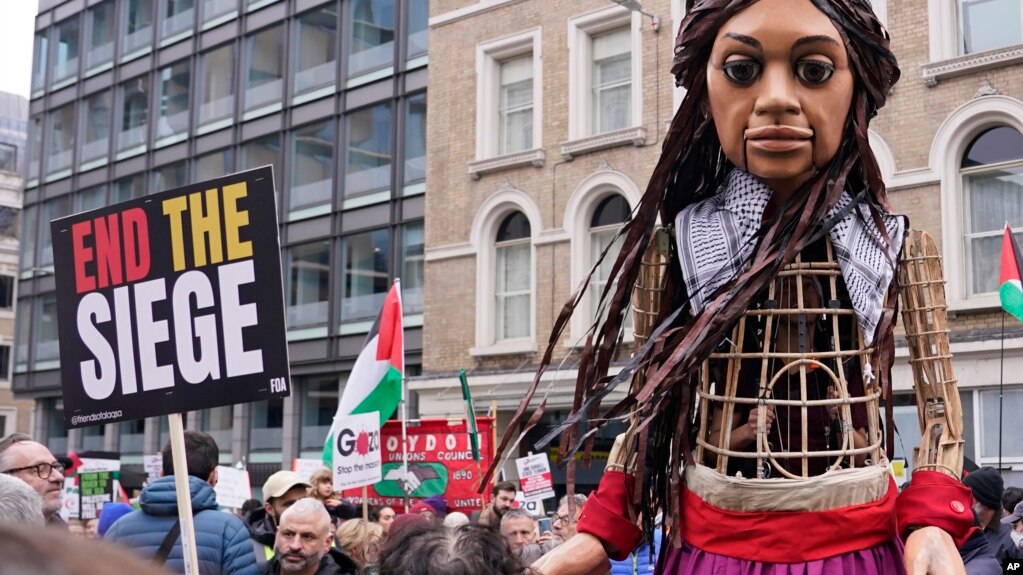
LONDON —
Children joined thousands of other demonstrators making their way through central London for a pro-Palestinian march Saturday, part of a global day of action against the longest and deadliest war between Israel and Palestinians in 75 years.
The plight of children in the Gaza Strip after nearly 100 days of the Israel-Hamas war was the focus of the latest London march, symbolized by the appearance of Little Amal, a 3.5-meter (11.5-foot) puppet originally meant to highlight the suffering of Syrian refugees.
The puppet had become a human rights emblem during an 8,000-kilometer (4,970-mile) journey from the Turkish-Syrian border to Manchester in July 2001.
Nearly two-thirds of the 23,843 people killed during Israel’s campaign in Gaza have been women and children, according to the Health Ministry in the Hamas-run territory.
Israel declared war in response to Hamas’ unprecedented cross-border attack on Oct. 7 in which the Islamic militant group killed some 1,200 people, mostly civilians, and took 250 others hostage. It was the deadliest attack in Israel’s history and the deadliest for Jews since the Holocaust.
March organizers said the Palestinian children will accompany Little Amal through the streets of central London.
“On Saturday Amal walks for those most vulnerable and for their bravery and resilience,” said Amir Nizar Zuabi, artistic director of The Walk Productions. “Amal is a child and a refugee, and today in Gaza childhood is under attack, with an unfathomable number of children killed. Childhood itself is being targeted. That’s why we walk.”
London’s Metropolitan Police force said some 1,700 officers will be on duty for the march, including many from outside the capital.
Home Secretary James Cleverly said he had been briefed by police commissioner Sir Mark Rowley on plans to “ensure order and safety” during the protest.
“I back them to use their powers to manage the protest and crack down on any criminality,” Cleverly said.
A number of conditions were placed on the march, including a directive that no participant in the protest shall venture near the Israeli Embassy.
A pro-Israel rally is set to take place in London on Sunday.
The London march was one of several others being held in European cities, including Paris, Rome, Milan and Dublin, where thousands also marched along the Irish capital's main thoroughfare.
Protesters waved Palestinian flags, held placards critical of the Irish, U.S. and Israeli governments and chanted, “Free, free Palestine.”
Thousands march in London for Gaza ‘day of action’
By AFP
January 13, 2024

A supporter waves a Palestinian flag during the march in central London calling for a ceasfire in Gaza - Copyright AFP ALASTAIR PIKE
Thousands of pro-Palestine protesters marched in central London on Saturday as part of a “global day of action” to oppose Israel’s bombing campaign in Gaza.
Around 1,700 police were on duty for the march, with major demonstrations taking place in London on most Saturdays since Israel began its war against Hamas following the October 7 attack.
“We want to show the people of Palestine we are with them and to speak up against our government as well,” 27-year-old health service worker Maleeha Ahmed, who was at the march with her family, told AFP.
“They are playing a very, very big role in allowing Israel to continue what they are doing and it’s just not acceptable,” she said.
Another marcher, Dipesh Kothar, 37, said it was “very frustrating to sit and watch the world do nothing”.
“That’s why we come out to show support for the Palestinian people and show our unhappiness with the governments around the world,” he said.
Saturday’s march holds particular significance given the UK’s air strikes in Yemen this week against Huthi bases, after attacks by the Iran-backed militants on ships in the Red Sea in solidarity with Gaza.
Police warned protesters that they face arrest if they “intentionally push the limit” with placards and chants.
They also said that protesters must stick to the route specified and that the event must finish by 5.00 pm (1700 GMT).
The day of action, involving 30 countries, was called by the UK organising coalition comprising the Palestine Solidarity Campaign, the Palestinian Forum in Britain, the Stop the War Coalition, the Campaign for Nuclear Disarmament, Friends of Al Aqsa and the Muslim Association of Britain.
“Millions of people will take to the streets across the world this Saturday, to demand a permanent ceasefire and a lasting political settlement for all Palestinians,” said Kate Hudson, general secretary of the Campaign for Nuclear Disarmament.
“The UK government must end its support for Israel’s brutal war in Gaza, and join the wider international community in condemning its war crimes,” she said.
Palestine in London
Demonstration part of global day of action, mobilizing for comprehensive cease-fire in Gaza across 60 cities in over 30 countries
Aysu Biçer |13.01.2024 - AA
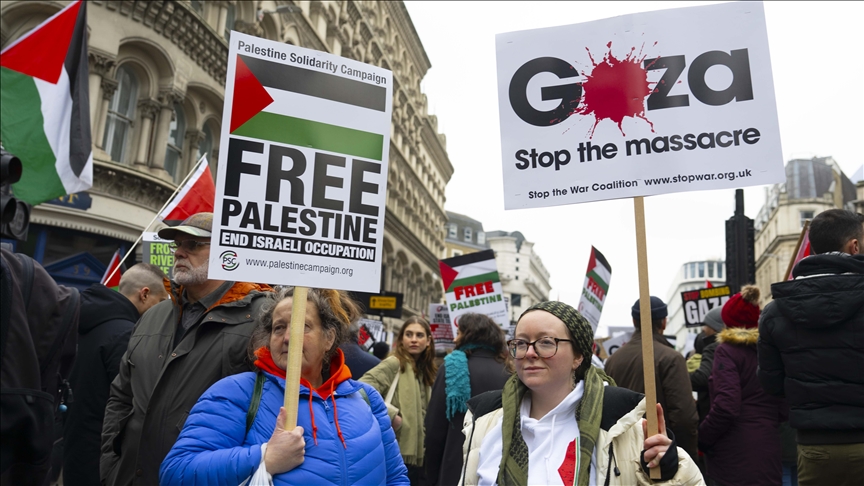
LONDON
A pro-Palestine march began on Saturday in the heart of London, marking the seventh demonstration in the British capital since Israel's onslaught on the Gaza Strip began in early October.
Drawing hundreds of thousands of participants, the event was organized by the Palestine Solidarity Campaign (PSC), which has lauded the protests as constituting "one of the largest, sustained political campaigns in British history."
This demonstration is part of a global day of action, mobilizing for a comprehensive cease-fire in Gaza across 60 cities and over 30 countries.
The groups departed from Bank junction in the City of London at roughly midday, heading via Fleet Street and Victoria Embankment to Parliament Square, where speeches are to take place.
The PSC, expecting about 250,000 participants in the march, which is the first since the new year began, acknowledged the myriad of developments in the region during this period.
Notably, the march featured the presence of Little Amal, a giant puppet representing a Syrian child refugee, who will join a group of Palestinian children in the procession. The symbolic addition aims to draw attention to the plight of refugees in the region.
Home Secretary James Cleverly, in anticipation of the protest, voiced confidence in the Metropolitan Police's ability to ensure order and safety during the event.
He endorsed the use of police powers to manage the protest and address any potential criminal activities.
Around 1,700 officers are on duty to police the march on Saturday, including many from forces outside London, with attendees warned that those who intentionally push legal limits on placards and slogans could face arrest.
'Hands off Yemen'
One thing that sets this march apart from its predecessors, which followed a different route through the city, was the diverse array of flags and banners unfurled throughout the crowd.
Alongside the familiar calls for a free Palestine and cease-fire in Gaza, it featured banners supporting South Africa, which has filed charges of genocide against Israel with the International Court of Justice in The Hague, and Yemen, where members of the Houthi group are blocking Israel-affiliated ships from entering the Red Sea.
The rally drew attention to the ongoing conflict in Yemen, with protesters holding banners with the demand, "Hands off Yemen."
The UK and US, with the support of Australia, Bahrain, Canada, and the Netherlands, conducted airstrikes Thursday against military targets in Houthi-controlled areas of Yemen, following a string of Houthi attacks in the Red Sea that destabilized trading routes.
"We won't stop until a permanent cease-fire is achieved," a protestor told Anadolu, asserting that the demonstration was sending a strong message that "the world is waking up to the interconnectedness of our struggles."
"South Africa's case against Israel resonates with us, and we're here to demand justice for all those facing injustice, be it in Gaza, Yemen, or anywhere else," she added.
South Africa, which filed the case in December, accused Israeli authorities of perpetrating genocide against Palestinians in Gaza. It requested provisional measures from the court to protect Palestinians, including by calling upon Israel to immediately halt military attacks.
South Africa laid out a list of alleged genocidal acts by Israel on the first day of the hearing Thursday, while Israel defended itself Friday.
Israel has killed more than 23,800 Palestinians in Gaza since an Oct. 7 cross-border offensive by Palestinian resistance group Hamas. The military campaign has also caused mass displacement, destruction, and hunger.


